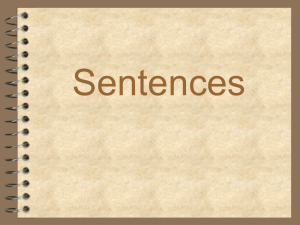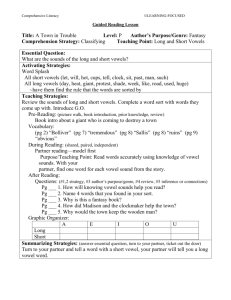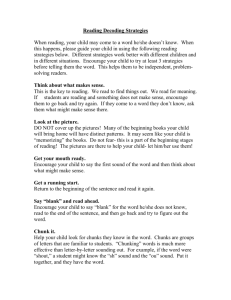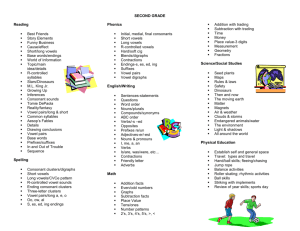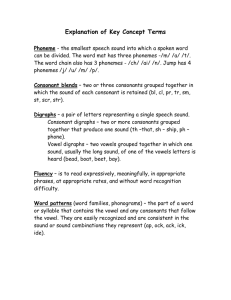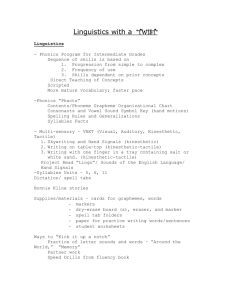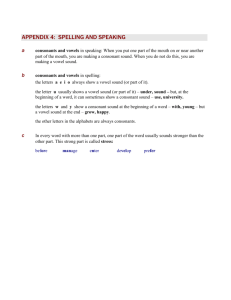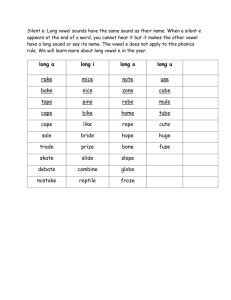Story PowerPoint
advertisement
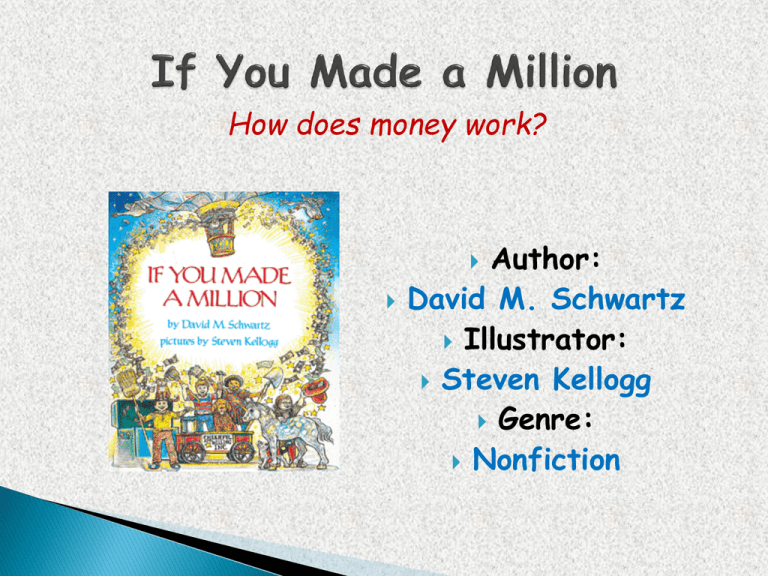
How does money work? Author: David M. Schwartz Illustrator: Steven Kellogg Genre: Nonfiction Timer clean agree teeth dream grain coach display window shadow cheese peach braid Sunday float thrown entertain complain bleachers willow wheat amount check earned expensive interest million thousand value worth Vocabulary Words afford feat denominations income inflation More Words to Know Monday Tuesday Wednesday Thursday Friday Question of the Day How does money work? Build Concepts Realism and Fantasy Monitor and Fix Up Build Background Vocabulary Fluency: Expression/Intonation Commands and Exclamations Long Vowel Digraphs Saving Money Fluency: Model Listen as I read “Where Do You Keep Your Money?” Notice how I use my tone of voice to model reading with expression. See how I stress certain words or phrases to show their importance. Notice how chunking text can help you understand. Be ready to answer questions after I finish. Is the story “Where Do You Keep Your Money?” more like a realistic story or a fantasy? Why? Why do you think authors who write realistic stories often choose to include events that did not really happen? Problems Saving Money Helps Turn to page 86. nickel Ten dollar bill Coins and Bills Word amount check earned expensive interest million thousand value worth Know Have Seen Don’t Know amount – the total sum check – a written order directing a bank to pay money to the person named earned – got money in return for work or service expensive – costing a lot of money interest – the money paid for the use of someone else’s money million – one thousand thousands; 1,000,000 thousand – ten hundreds; 1,000 value – the real worth of something in money worth – equal in value to afford – to have the money, means, or time for feat – an act that shows great skill, strength, or daring denominations – the various amounts used as money income – the money that someone earns inflation – a sudden or steady increase in the price of goods Next Slide Grammar: hannah dreemed she had one hundred dollar Hannah dreamed she had one hundred dollars. nick and i took our pennys to the bank Nick and I took our pennies to the bank. Take your pick—they’re all worth ten dollars. That was well done! The first sentence is a command. The second sentence is a exclamation. A sentence that tells someone to do something is a command. A sentence that shows strong feelings is an exclamation. Command: Put a dollar on the counter. Exclamation: What a bright penny that is! Some commands begins with please. Commands usually end with periods. The subject of a command is you. The word you is not written or said, but it is understood. Exclamations can express feelings such as surprise, anger, or excitement. Exclamations begin with a capital letter and end with an exclamation mark. Please give me change for a dollar. command Put the money in your pocket. command What a big bag of pennies that is! exclamation Count the pennies carefully. command I am so tired of counting! exclamation That castle is so beautiful That castle is so beautiful! Take a picture of the lovely gardens Take a picture of the lovely gardens. How expensive it must be How expensive it must be! Think about living in a place like that Think about living in a place like that. What a daydream that is What a daydream that is! Spelling: clean agree teeth dream grain coach display window shadow cheese peach braid Sunday float thrown entertain complain bleachers willow wheat Question of the Day What are some examples of situations in which you might prefer to have either coins or paper money? Long Vowel Digraphs Context Clues Realism and Fantasy Monitor and Fix Up Context Clues Develop Vocabulary Fluency: Choral Reading Commands and Exclamations Long Vowel Digraphs Economics: Costs and Benefits Turn to page 88. Pages 90 - 99 Fluency: Turn to page 101. As I read, notice how I chunk the money combinations. Now we will practice together doing three choral readings of page 101. Grammar: what a beautiful sundy it is What a beautiful Sunday it is! dad agread to cash the check for me Dad agreed to cash the check for me. A sentence that tells someone to do something is a command. Some commands begin with please. Commands usually end with period. Sentences that show strong feels are exclamations. Exclamations begin with a capital letter and end with an exclamation mark. Spelling: clean agree teeth dream grain coach display window shadow cheese peach braid Sunday float thrown entertain complain bleachers willow wheat Question of the Day Why do you think some people keep on working even after they earn a million dollars? Realism and Fantasy Monitor and Fix Up Context Clues Sequence Develop Vocabulary Fluency: Expression/Intonation Commands and Exclamations Long Vowel Digraphs Research Money Pages 100 - 111 Fluency: Turn to page 106. As I read, notice how I read with a steady rhythm and how I chunk the words that begin with the same letter. Now we will practice together doing three echo readings of page 106. Grammar: beth is worryed about loseing her money Beth is worried about losing her money. was that beths quarter Was that Beth’s quarter? The subject of a command is you, so a command can get readers’ attention. Exclamations can make writing vivid by expressing surprise, anger, or excitement. Spelling: clean agree teeth dream grain coach display window shadow cheese peach braid Sunday float thrown entertain complain bleachers willow wheat Question of the Day How might people today pay for things if we no longer had any coins or paper money? Word Endings –ed, -ing, -er, -est Picture Encyclopedia/Text Features Reading Across Texts Content-Area Vocabulary Commands and Exclamations Long Vowel Digraphs Credit Cards Pages 112 - 115 Fluency: Turn to page 106. We will partner read this page aloud three times. Read with proper intonation and offer each other feedback. Grammar: have you seen this kind of nickle Have you seen this kind of nickel? the boys is colecting coins The boys are collecting coins. Test Tip: You might be asked to identify commands and exclamations. Commands often begin with an action verb, such as take or play. Like questions, exclamations may begin with what or how. However, exclamations end with exclamation marks, not question marks. Command: Take the ball outside. Exclamation: What a nice day it is! Question: What is in the sky? Spelling: clean agree teeth dream grain coach display window shadow cheese peach braid Sunday float thrown entertain complain bleachers willow wheat Question of the Day How does money work? Concept Vocabulary Realism and Fantasy Illustrations Context Clues Presentations Commands and Exclamations Long Vowel Digraphs Parts of a Book Saving Money A realistic story could really happen. Nonfiction writing gives facts and is realistic. In a fantasy, things happen that are not real. A fantasy is fiction writing, but nonfiction writing can give facts about a fantasy. Graphic sources include pictures and illustrations. They can be used to show information in a way that the reader can see. Look at illustrations before reading to get an idea of what the reading will be about. Look at illustrations as you read to help increase your understanding. Multiple-meaning words are words that have more than one meaning. You can use context clues to determine the meaning of multiple-meaning words. List any unknown words you find as you read “If You made a Million”. Create a chart showing the unknown word, helpful context clues, and their definition of the word based on its context. You can confirm word meanings using a dictionary. Word Context Clues Meaning Multiple-meaning words, such as bank, have a specific meaning in a sentence. Only one meaning makes sense in the sentence. With a partner, use reference sources to find the two meanings for each word in the chart, then write a sentence for each. Word Meaning 1 rest mean lie flu Meaning 2 Grammar: display you’re photos in this window Display your photos in this window. Does jen and jeff enjoy their work Do Jen and Jess enjoy their work? Spelling: clean agree teeth dream grain coach display window shadow cheese peach braid Sunday float thrown entertain complain bleachers willow wheat Vowels can stand for long or short sounds. seal What vowel sound do you hear in seal? long e How many vowels do you see in seal? 2, e and a How many vowels do you see in each of these words, and what vowel sound do you hear? tree wait stray goat slow When I see two vowels in a row, I try saying the long vowel sound of the first vowel. Don’t say the second vowel at all. “When two vowels go walking, the first one does the talking, and the second one stays quiet.” Both y and w can be consonants or vowels. When they come at the end of a word or syllable, they are vowels, so ay and ow are both vowel pairs. The letter q is almost always followed by u and stands for /kw/. Quit looks like it has two vowels together, but it does not have a long vowel digraph. approach defeat streamer e-mail between rainbow dismay overflow When the boat’s motor broke, we had to row it. Ellen is not afraid to swim in the bay. Dean, don’t ride the bike in the street. We studied words with endings –ed, -ing, -er, and -est. Read this sentence to yourself. Raise your hand when you know which words have endings. Sam carried the heaviest suitcase. carried, heaviest How did each base word change when the ending was added? The y changed to i. What are some other changes you might need to make before adding an ending? The puppy is becoming bigger every day. becoming, bigger How did each base word change when the ending was added? becoming – silent e is dropped. bigger – double final consonant deceiving angriest hurried largest fitted flattest behaved babysitting riper tardier quitting sorrier Natalie was troubled about leaving her dog in the kennel. Andy denied that he was the laziest team member. Leah stopped running because she was beginning to feel out of breath. Spelling City: Spelling Words Vocabulary Words More Vocabulary Words Story test AR ◦ Classroom webpage, ◦ Reading Test ◦ Other Reading Quizzes ◦ Quiz #
